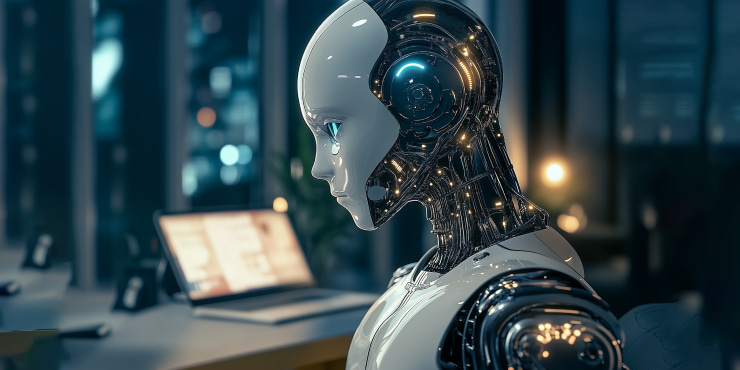Introduction
When most people hear the term artificial intelligence (AI), they often think of robots, sci-fi movies, or futuristic technologies. But in reality, AI is already part of your daily life—and chances are, you’re interacting with it multiple times a day without even knowing it.
From unlocking your smartphone to getting directions, AI is working behind the scenes to make your life easier, more efficient, and more personalised. In this article, we’ll explore how AI in everyday life has become more common than ever and why you’re probably using it far more than you think.
What Is Artificial Intelligence, Really?
AI is a branch of computer science that allows machines to mimic human intelligence. This includes tasks like learning, problem-solving, speech recognition, and decision-making. Thanks to machine learning and deep learning, AI can now analyse massive datasets, learn from them, and make decisions or predictions in real time.
In other words, AI doesn’t always look like a robot with glowing eyes—it can be as simple as your email filter or the voice assistant on your phone.
1. Smartphones: Your Pocket AI Assistant
Your smartphone is probably the most powerful AI device you own—and you use it all day.
Examples:
- Voice Assistants: Siri, Google Assistant, and Alexa use AI for natural language processing to understand your questions and respond accordingly.
- Face Recognition: Unlocking your phone with your face uses AI-powered image recognition.
- Autocorrect and Predictive Text: Your phone learns how you type and offers suggestions tailored to your writing style.
Why It Matters:
AI in smartphones is designed to make your experience more personalised and efficient—suggesting apps, sorting photos, and even recommending when to leave for work.
2. Social Media Feeds
Ever wonder why your social media feed seems to “know” exactly what you want to see? That’s AI in action.
Behind the Scenes:
- Content Recommendation Algorithms analyse your behaviour—likes, shares, time spent on posts—to decide what to show you next.
- Facial recognition in platforms like Facebook helps tag your friends in photos.
- Ad Targeting uses AI to serve you ads that match your interests and behaviour.
Why It Matters:
AI is what keeps you scrolling by showing you content that resonates, but it also raises ethical concerns about echo chambers and privacy.
3. Streaming Services and Music Apps
Platforms like Netflix, YouTube, and Spotify use AI to personalise your entertainment.
AI at Work:
- Recommendation engines suggest movies, shows, and music based on your viewing/listening history.
- Thumbnail Optimisation: Netflix uses AI to choose the best image to entice you to click on a show.
- Auto-subtitles and speech recognition improve accessibility.
Why It Matters:
You enjoy a seamless and engaging experience, often discovering new content without having to search too hard.
4. Navigation and Ride-Sharing Apps
Apps like Google Maps, Waze, Uber, and Lyft rely heavily on real-time AI to help you get around.
Smart Features:
- Traffic Prediction: AI evaluates current traffic conditions to suggest faster routes.
- ETAs: Machine learning refines estimated arrival times based on patterns.
- Dynamic Pricing: Ride fares change with demand—calculated using AI.
Why It Matters:
These apps save you time, money, and hassle—thanks to AI making smart decisions behind the scenes.
5. Online Shopping and E-commerce
Ever noticed how Amazon seems to know what you need before you do? That’s not magic—it’s AI.
In Action:
- Product recommendations based on your browsing and purchase history.
- Chatbots help with customer service queries 24/7.
- Fraud detection protects your purchases and payment information.
Why It Matters:
AI helps you find what you need faster, improves customer service, and enhances security.
6. Smart Homes and IoT Devices
From smart thermostats to intelligent lighting, AI is making homes smarter and more energy-efficient.
Examples:
- Smart speakers (like Amazon Echo or Google Home) learn your preferences to adjust music, alarms, and even news briefings.
- Smart thermostats (like Nest) analyse your habits and adjust heating/cooling accordingly.
- Robot vacuums use sensors and AI to map your home and clean more effectively.
Why It Matters:
These systems automate everyday tasks, enhance comfort, and reduce energy costs.
7. Banking and Financial Services
AI is transforming how you interact with your bank and manage your money.
Examples:
- Fraud Alerts: AI detects unusual activity and alerts you instantly.
- Budgeting apps use AI to track spending and offer personalised advice.
- Loan Approvals: Banks use AI algorithms to assess creditworthiness faster.
Why It Matters:
Your financial security and decision-making are increasingly supported by AI analysis and insights.
8. Email and Communication Tools
Even your inbox is powered by AI—helping you stay productive and secure. Common Features:
- Spam filters sort out unwanted emails using AI.
- Smart Reply and Autocomplete tools like those in Gmail predict your responses.
- Language translation in Google Translate is now powered by neural machine translation—a form of AI.
Why It Matters:
You save time, avoid junk, and communicate more efficiently with the help of AI.
9. Healthcare and Wellness Apps
AI is not just about convenience—it’s also saving lives and improving health.
Examples:
- Fitness trackers analyse your movement, heart rate, and sleep patterns to offer health suggestions.
- AI symptom checkers (like WebMD or Babylon Health) give basic health advice.
- Medical imaging tools help doctors detect conditions like cancer early through image analysis.
Why It Matters:
AI is making healthcare more accessible, preventative, and personalised—even from your phone.
Conclusion
You don’t need to be a tech expert to realise that AI in everyday life is already here—and growing fast. From how you wake up in the morning to how you fall asleep, AI is quietly working in the background to enhance, personalise, and optimise your experience.
As we continue to rely more on AI-driven systems, it’s important to stay informed—not just to use these tools but to understand how they shape our decisions, routines, and even values. AI may seem invisible, but its impact is anything but.
So next time your phone unlocks with your face or your playlist seems oddly perfect—just remember: you’re using AI more than you think.




